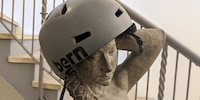
Guide
Key bike helmet considerations
by Michael Restin

As soon as a helmet is on your head, a fuse blows in the human brain. It weighs up less. A study shows that well-protected brain activity decreases during decision-making processes - even when playing games of chance on the computer.
The helmet wearer is generally regarded as a rational being. Instead of letting the wind blow through his hair in a death-defying manner while cycling, he squeezes a polystyrene shell onto his fontanel and fastens it with a strap under his chin. All for the feeling of being on the safe side in an emergency. And it's true that a helmet can save lives. But it's also the case that your brain is aware of the better protection - and brings out the daredevil in you.
In psychology, this phenomenon is known as risk compensation. According to the motto: "Better protection? Full throttle then!", a number of innovations have already led to more accidents. When cars with the useful anti-lock braking system (ABS) came onto the market, drivers were soon involved in an above-average number of crashes. When ski helmets became widespread on the slopes, significantly fewer adults took part in beginner courses. Instead, a striking number of injured helmet wearers were scraped off the slopes. As stupid as it all is, I can understand it quite well. I would also rather jump into the depths with a helmet on my head and a bungee cord on my legs than without one.

I was still surprised at how much our brains can be lulled by a simple bike helmet. The protective equipment doesn't have to have anything to do with the activity. For a study, test subjects were allowed to play on the computer with and without head protection. The "Balloon Analogue Risk Task" that they had in front of them only involved blowing up a balloon on the screen by pressing a button. The plumper it gets, the more points you get. Of course, if it bursts, you get nothing. And lo and behold: the bike helmet spitters were significantly more willing to take risks than the casual baseball cap wearers in the control group.
Psychologist Barbara Schmidt from the University of Jena and her team have now investigated what goes on in helmeted heads. Although her 40 test subjects were not asked to inflate balloons, they had to choose between a risky and a safe option in a game of chance on the computer. The brain waves were measured by EEG. Half of the group were given an excuse to put on a bicycle helmet and were suddenly in "I can't pass" mode.
They were not generally more willing to take risks, as in the previous study, but there was significantly less activity in the areas of the brain responsible for making judgements during decision-making processes. The helmet wearers felt safer for no rational reason whatsoever, as it made no difference to the task whether they were sitting in front of the screen in swimming trunks and flip-flops or in knight's armour. Yet another example of the fact that we have much less control over ourselves than we like to believe. What do you conclude from this? Before you decide on an answer: Please take off your helmet. Thank you.
How do you feel about the helmet?
The competition has ended.
Simple writer and dad of two who likes to be on the move, wading through everyday family life. Juggling several balls, I'll occasionally drop one. It could be a ball, or a remark. Or both.